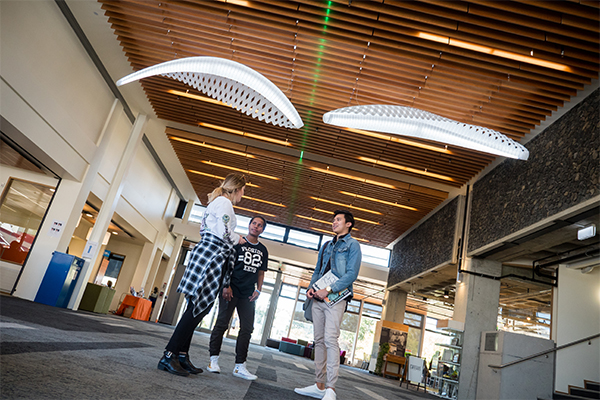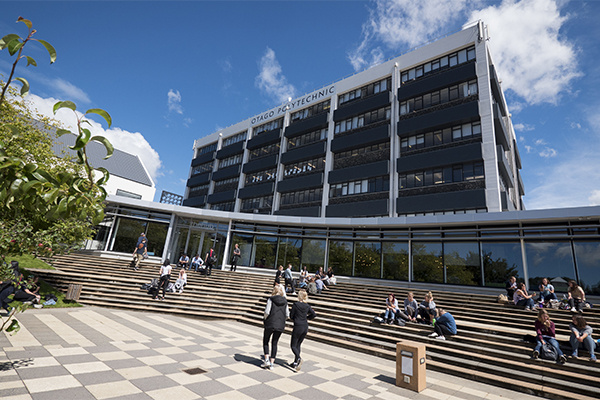Medium-Large Organisation Winner

By aspiring to embed Te Tiriti o Waitangi principles in all levels of their organisation, Otago Polytechnic Ltd recognised the need to partner with local mana whenua.
The organisation entered a partnership with Kā Papatipu Rūnaka (four rūnaka of the tribal takiwā or region) in 2004 and, working together, in 2006 launched a Māori Strategic Framework to empower the education aspirations of Māori in the region.
Otago Polytechnic Ltd is a tertiary education institute based in Dunedin. It has campuses in Cromwell and Auckland and employs more than 900 staff. The organisation’s vision and values place learners at the centre of its focus.
To provide education that uplifts people in its communities and enhances the region and Aotearoa, the polytechnic placed specific importance on reflecting Te Tiriti o Waitangi in the organisation.
The partnership with Kā Papatipu Rūnaka was formalised with a Memorandum of Understanding that established four key priorities.
- Gives effect to the treaty framework principles of local iwi, Ngāi Tahu, and establishes the rights and obligations of both partners in addressing Māori and Ngāi Tahu priorities.
- Alignment with Te Tiriti o Waitangi and is consistent with Ngāi Tahu goals and aspirations.
- Relationships that reinforce the status of Kā Papatipu Rūnaka as mana whenua and will meet the needs of all Māori living in the tribal area.
- Expectations that identify education objectives and aspirations of mana whenua, development of a strategic framework for how objectives and aspirations will be met and recognise and prioritise the needs of Māori.
Through this partnership, various significant governance decisions were made.
- One mana whenua representative was appointed to the Otago Polytechnic Council and to chair the sub-committee, Komiti Kāwanataka,
- One council meeting per year is held at one of the papatipu marae, and
- The role of Deputy Chief Executive: Māori Development was established in the Executive Leadership Team.
Sixteen years on, Chief Executive Dr Megan Gibbons says, “Komiti Kāwanataka are the direct link to mana whenua and sit alongside the Otago Polytechnic Board at governance level. Three of the six Deputy Chief Executives are of iwi Māori descent, and all are responsible for advancing the Māori Strategic Framework and direction given by Komiti Kāwanataka.”
Based on te ao Māori principles, the framework ensures that Otago Polytechnic provides an inclusive working and learning environment where Māori feel confident and supported to be themselves, express their culture and realise their full potential.

This is evident in the experience of Shaun Tahau who joined Otago Polytechnic as a marketing liaison in 2013. His leadership and te reo Māori abilities were recognised and he was given an opportunity to realign his career options with his passion to promote te reo Māori and its appropriate use in the workplace. He was supported to complete a Master of Professional Practice, the first to be done completely in te reo Māori, and he then secured a role in the Office of the Kaitohutohu (Deputy Chief Executive: Māori Development) where he developed the te reo Māori strategy for the organisation. He has recently been appointed Tumuaki Whakawhanake (Director: Māori Capability).
Mana whenua representative David Higgins of Te Rūnanga o Moeraki says they are extremely proud of the achievements that have come from the framework.
“I would like to acknowledge key Māori staff and other champions across Otago Polytechnic for their ongoing support, guidance and education of our Māori learners. It is this commitment and care that makes a real difference for our whānau,” he says.
Chief Executive Megan Gibbons credits the framework for how embedded te ao Māori values are in their vision, values, processes, practices, and environment.
“We are committed to increasing both the proportion of our staff who are Māori, as well as growing Māori leadership. One hundred per cent of our Māori staff are proud to tell people they work for us, really care about our success and that it is a fun and enjoyable place to work,” she says.






